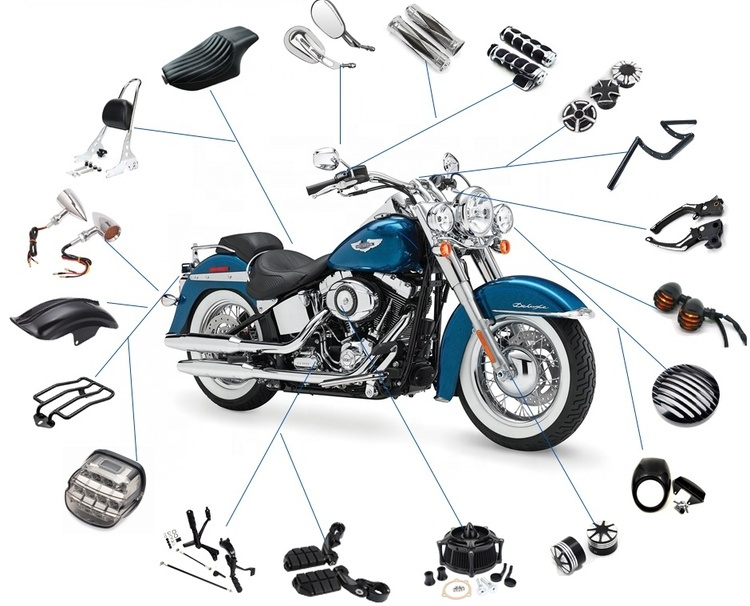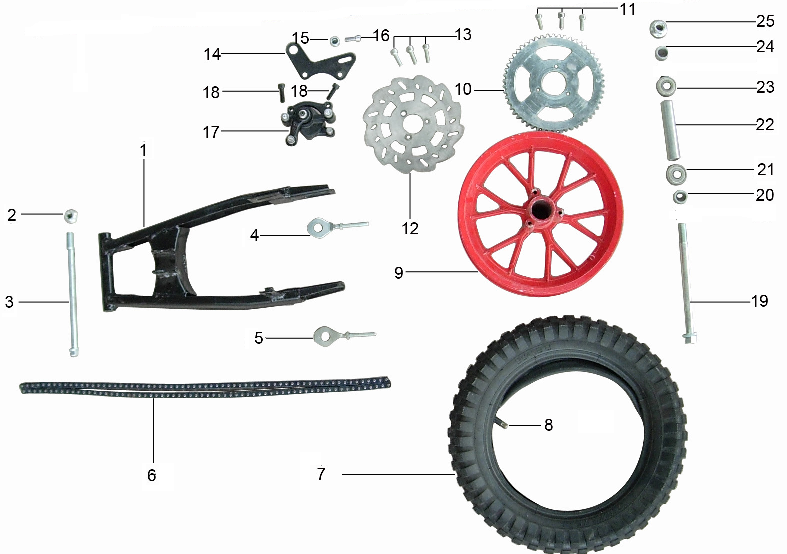Discover the Essential MotorBike Parts You Required for Optimum Efficiency
Understanding the important parts of a bike is essential for achieving peak efficiency. Each element, from the engine to the stopping system, plays an important role in overall functionality and safety. Normal upkeep can avoid unanticipated failures and boost the riding experience. Numerous riders neglect the details of these systems. Uncovering exactly how they collaborate can cause a much more effective experience. What essential parts should every cyclist focus on?
The Engine: The Heart of Your Bike
The engine acts as the core component of a motorcycle, driving its efficiency and specifying its capabilities. It is liable for converting gas into mechanical power, which powers the bike ahead. Numerous kinds of engines are utilized, including single-cylinder, V-twin, and inline configurations, each offering unique attributes fit for different riding purposes and designs. The engine dimension, typically gauged in cubic centimeters (cc), considerably influences efficiency, with bigger engines normally giving even more power and torque.Furthermore, the engine's design and innovation, such as fuel injection systems or air-cooling versus liquid-cooling, impact efficiency and integrity. Upkeep is vital for peak procedure; elements like normal oil modifications and monitoring trigger connects assurance long life. Bikers often take into consideration an engine's responsiveness and smoothness, as these characteristics enhance the general riding experience. Inevitably, the engine continues to be an essential element that defines not only the motorcycle's efficiency yet likewise the rider's connection to the device.
The Transmission: Shifting Gears Efficiently
The transmission plays an important role in a motorcycle's efficiency, especially in the technicians of gear shifting. Understanding how to move equipments efficiently can enhance the general riding experience, while regular upkeep guarantees peak capability. Correct interest to these aspects can substantially impact the longevity and effectiveness of the bike.

Equipment Shifting Mechanics
Smooth equipment changing is important for optimal motorbike efficiency, significantly affecting both velocity and control. The mechanics of equipment moving involve the interaction in between the clutch, gear lever, and transmission system. When a biker involves the clutch, it disengages the engine from the transmission, enabling an equipment change without harming the elements. A well-timed launch of the clutch, incorporated with accurate movement of the equipment lever, assists in a smooth change between gears. This process ensures that the engine runs within its best power band, improving efficiency. Motorcycle Parts Auckland. In addition, recognizing the gear proportions and their impact on rate and torque can help riders make notified options during changes, eventually adding to an extra enjoyable and responsive riding experience
Maintenance Tips Importance
Regular upkeep plays a necessary role in assuring that the transmission system runs successfully, permitting smooth equipment changes. On a regular basis inspecting and changing the transmission liquid is important, as old fluid can cause boosted rubbing and wear. Furthermore, inspecting the clutch for wear guarantees peak involvement and disengagement, protecting against slippage throughout equipment modifications. Lubrication of moving components is just as vital to minimize rubbing and enhance efficiency. Motorbike proprietors need to additionally monitor for leaks and uncommon noises, as these can indicate underlying issues. By sticking to these upkeep ideas, bikers can prolong the life expectancy of their transmission system, ensuring that gear shifts stay seamless and adding to the general performance of their motorbike.
The Braking System: Ensuring Safety on Every Trip
Braking systems are essential parts that directly influence a motorcycle's safety and performance. They contain numerous parts, consisting of brake pads, blades, calipers, and hydraulic lines, all working with each other to guarantee effective deceleration. The type of braking system-- generally either disc or drum-- influences responsiveness and quiting power.Regular upkeep is necessary to promote peak performance; worn brake pads can lead to decreased effectiveness and enhanced stopping distances. In addition, the quality of brake fluid should be kept an eye on, as it can absorb dampness gradually, jeopardizing stopping efficiency.Riders ought to additionally think about the relevance of anti-lock braking systems (ABS), which stop wheel lockup during sudden quits, boosting general safety. Effectively working brakes are not nearly stopping; they instill confidence in the cyclist, permitting safer navigation with various terrains. Eventually, a dependable stopping system is critical for enjoying every experience with tranquility of mind.
The Suspension: Enhancing Comfort and Control
A well-functioning suspension system significantly adds to a motorbike's total efficiency, complementing the efficiency of the stopping system. The suspension plays a considerable duty in absorbing shocks from irregular surface areas, guaranteeing a smoother ride while keeping tire call with the roadway. This get in touch with is crucial for both security and control, allowing bikers to browse edges with confidence and precision.Different kinds of suspension systems, such as telescopic forks or mono-shocks, use differing levels of convenience and handling. Correctly tuned suspension enhances responsiveness, giving the rider with a much more connected feel to the motorbike. Routine maintenance checks are very important to establish the suspension elements, consisting of dampers and springs, are working at their ideal. More Bonuses A reliable shock absorber not just boosts the riding experience however likewise adds to the long life of other motorbike components by reducing damage. As an outcome, purchasing top quality suspension is vital for any significant motorcycle lover.
The Tires: Linking You to the Road
Tires play an important function in a motorbike's efficiency, acting as the key link between the motorcyclist and the road. Comprehending the different kinds of tires readily available can considerably affect taking care of and safety. Furthermore, Bonuses normal maintenance is essential to ensure peak tire efficiency and durability.
Tire Keys In Explained
How do different tire types affect a motorbike's efficiency? Tire kinds play an essential role in establishing a motorbike's handling, grasp, and stability. Sporting activity tires, made for high efficiency, offer improved grip and responsiveness on paved roads, making them optimal for competing and hostile riding. Alternatively, touring tires prioritize longevity and convenience, giving a smoother experience for long-distance travel. Off-road tires, characterized by their sturdy tread patterns, excel in traction on unpaved surfaces, appropriate for experience lovers. Furthermore, dual-sport tires blend qualities from both off-road and on-road groups, providing to flexible riding demands. Eventually, picking the best tire type is essential for enhancing efficiency, making sure security, and improving the general riding experience.
Maintenance Tips Offered
While riding on the road, keeping suitable tire problem is important for security and efficiency. Frequently checking tire pressure is vital, as under-inflated tires can lead to inadequate handling and enhanced wear. It is advisable to evaluate walk depth regularly; worn tires compromise grip and security. On top of that, cyclists ought to seek indications of damages, such as bulges or splits, which can indicate the requirement for replacement. Turning tires periodically guarantees even use, enhancing long life. Maintaining tires clean from debris and preventing too much aesthetics can lengthen their life expectancy. Preserving proper alignment and balance contributes to peak efficiency, minimizing tension on various other bike components. Abiding by these upkeep tips will greatly enhance the general riding experience.
The Fuel System: Fueling Performance and Performance
The fuel system plays a vital role in maximizing a motorbike's efficiency and effectiveness, as it ensures the optimum distribution of fuel to the engine. It consists of several essential components, consisting of the fuel tank, gas pump, gas filter, and gas injectors or carburetor. Each part needs to work effectively to guarantee a smooth and powerful ride.The fuel container stores fuel and supplies it to the engine by means of the gas pump, which creates the necessary pressure. A fuel filter protects against pollutants from entering the engine, while the injectors or carburetor mix fuel with air for combustion.Proper upkeep of the gas system is vital; a blocked filter or malfunctioning injector can bring about lowered efficiency and enhanced gas usage. By verifying that the fuel system operates successfully, bikers can enjoy enhanced throttle action, better gas economic climate, and web link overall boosted riding experience.
The Electrical System: Powering Your Trip
A reliable electrical system is vital for the overall functionality and security of a motorcycle, as it powers essential components such as the ignition, illumination, and numerous electronic systems. This system includes the battery, which stores energy, and the alternator, accountable for producing power while the engine runs. The wiring harness connects these parts, making certain dependable power distribution.Additionally, fuses shield the system from overloads, while relays assist manage high-current devices with low-power signals. A properly maintained electrical system improves performance by making sure smooth beginnings and consistent operation of signals and lights, important for motorcyclist exposure and safety.Regular checks of the battery's cost and links are necessary for protecting against electrical failings. Bikers should additionally inspect circuitry for deterioration, ensuring all components work preferably. Ultimately, a robust electrical system adds considerably to the overall efficiency and integrity of the motorcycle.
Often Asked Inquiries
How Often Should I Change My Motorbike's Battery?
The regularity of bike battery substitute depends upon usage and maintenance (Motorcycle Parts Auckland). Normally, batteries must be changed every three to 5 years. Normal checks can assist determine when a replacement is needed for peak efficiency
What Tools Do I Required for Basic Bike Maintenance?
For basic motorbike upkeep, one needs necessary tools such as an outlet set, wrenches, screwdrivers, pliers, tire pressure gauge, and a torque wrench. These devices promote effective maintenance and guarantee the motorcycle runs successfully and safely.
How Can I Enhance My Motorbike's The rules of aerodynamics?
To enhance motorbike aerodynamics, one ought to take into consideration adjusting fairings, making use of windscreen expansions, optimizing body setting, and minimizing general weight. These alterations assist minimize drag, improving security and gas effectiveness throughout rides.
What Are the Indications of a Failing Electrical System?
Indications of a stopping working electric system include lowering lights, problem starting, irregular tool analyses, and blown fuses. Motorcycle Parts Auckland. Uncommon scents or deterioration around battery terminals might likewise suggest underlying issues needing instant focus for safety and security and efficiency

Exactly how Do I Choose the Right Oil for My Motorcycle?
When selecting oil for a motorbike, one must consider the supplier's requirements, thickness rankings, and the sort of riding. Furthermore, artificial versus traditional oil can affect efficiency and engine defense, influencing the decision significantly. The engine size, commonly measured in cubic centimeters (cc), significantly influences efficiency, with larger engines usually supplying more power and torque.Furthermore, the engine's style and innovation, such as fuel injection systems or air-cooling versus liquid-cooling, impact efficiency and integrity. A well-functioning suspension system considerably adds to a motorcycle's total performance, enhancing the efficiency of the stopping system. The gas system plays a vital role in making best use of a motorcycle's efficiency and efficiency, as it ensures the optimal distribution of fuel to the engine. A gas filter protects against contaminants from going into the engine, while the injectors or carburetor mix fuel with air for combustion.Proper upkeep of the fuel system is vital; a blocked filter or malfunctioning injector can lead to decreased performance and boosted gas intake. A well-kept electrical system enhances performance by guaranteeing smooth beginnings and consistent operation of signals and lights, crucial for rider visibility and safety.Regular checks of the battery's charge and links are vital for preventing electrical failings.